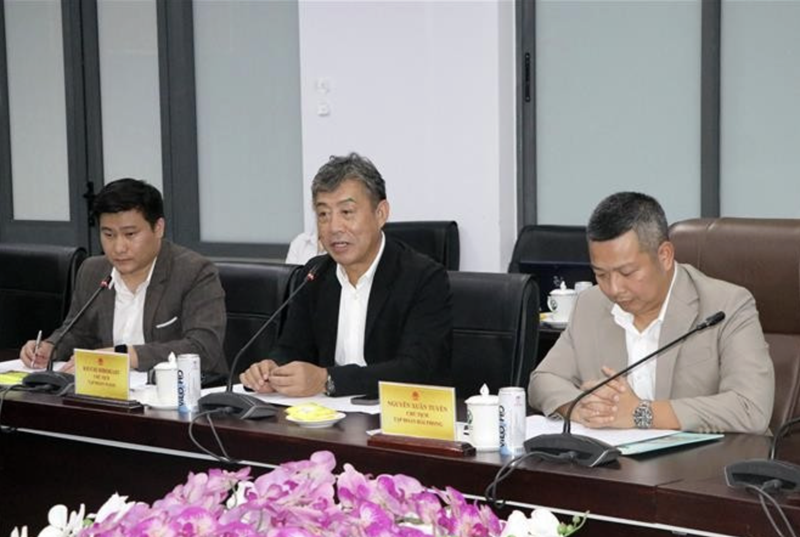Chairman of the provincial People’s Committee Luu Quang Ngoi said Vinh Long, located at the heart of the Mekong Delta, enjoys favorable conditions for agricultural production, agro-processing, and logistics. The province is focusing on three strategic directions, including promoting deep processing of key agricultural and aquatic products to raise added value, reduce post-harvest losses, and diversify products to meet international demand.
    |
 |
|
WAGO Group Chairman Kiuchi Hirokazu speaks at the meeting with representatives of the People’s Committee of Vinh Long province on September 12. |
It is working to build sustainable value chains that link farmers, enterprises, scientists, and distributors, especially expanding international-standard traceability and quality management systems to target high-end markets. Besides, Vinh Long also aims to strengthen cooperation in technology, trade, and human resources, ranging from digital agriculture and logistics-based commercialization to e-commerce and public – private partnerships.
"The provincial administration is committed to accompanying enterprises by creating the most favorable conditions in terms of administrative procedures and policies, and ensuring a transparent, stable, competitive, and efficient investment environment,” Ngoi stressed.
WAGO Group Chairman Kiuchi Hirokazu noted that Vinh Long boasts one of the largest rice cultivation areas in the Mekong Delta, producing a huge volume of rice husks. Instead of being treated as waste, rice husks can be used as feedstock for biomass power plants and as raw material for silica, a key component in construction materials and solar panel production.
The group proposed building a biomass power plant in Vinh Long where rice husks would be burned to generate steam for turbines. The remaining ash would be processed into silica.
According to Kiuchi, the model offers both economic and environmental benefits by reducing agricultural waste and generating new raw materials for industry.
He added that Vinh Long has major advantages in fruits such as mango, orange, and sweet potato, as well as aquaculture products that could be exported to Japan. However, he emphasized that exports must meet Japan’s strict food safety and phytosanitary standards.
WAGO, in partnership with the Hai Phong Company, expressed interest in investing in agro-processing facilities to support production and export of the province’s key products to the Japanese market.
Tran Quoc Tuan, Director of the provincial Department of Industry and Trade, said the region has abundant raw materials to support biomass power generation. Vinh Long alone produces around 380,000 tons of rice husks annually while the Mekong Delta generates about 5 million tons. This provides a strong foundation for WAGO’s investment proposal.
He added that Vinh Long is also prioritizing renewable energy development as a driver of future growth.
Deputy Director of the provincial Department of Agriculture and Environment Le Van Dung highlighted Vinh Long’s strong agricultural base. Each year, the province cultivates about 330,000 hectares of rice, yielding 1.9 million tons of unhusked grains, with 80% being high-quality varieties. It also has more than 101,000 hectares of fruit trees with an annual output of 2.25 million tons, including pomelo, mango, durian, rambutan, and mangosteen.
Coconut is a key product, with nearly 120,000 hectares under cultivation, accounting for over half of the country’s total, forming a major raw material source for deep processing and export. The province also boasts about 110,000 hectares of aquaculture, producing 620,000 tons annually, with black tiger shrimp, white-leg shrimp, giant freshwater prawns, mud crabs, and tra fish among the main products.
In 2024, Vinh Long’s exports to Japan reached 621.9 million USD. In the first eight months of 2025 alone, the figure stood at 457.6 million USD, with key items including protective nets, electrical wire harnesses, coconut-based products, aquatic products, fresh fruit, and apparel.
Source: VNA